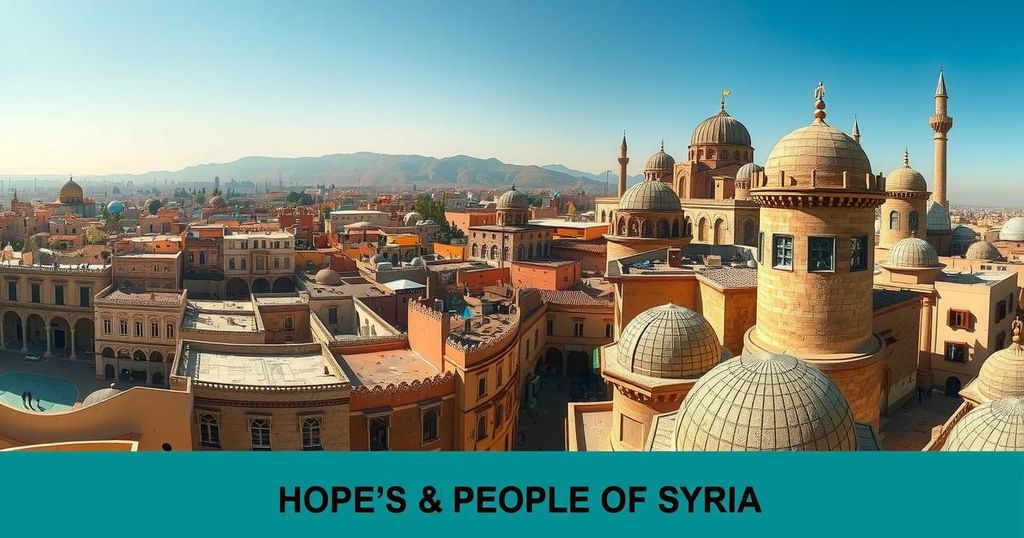Global news
AHMAD AL - SHARAA, ARAB NEWS, ASIA, DAMASCUS, DONALD TRUMP, FAI, FAISAL BIN FARHAN AL - SAUD, FOREIGN POLICY, GAZA CONFLICT, INTERNATIONAL DEVELOPMENT ASSOCIATION, INTERNATIONAL RELATIONS, MAR, MARWAH MORHLY, MIDDLE EAST, MOR, MORHLY, SANCTIONS, SAUDI ARABIA, STATE DEPARTMENT, SYRIA, TURKIYE, US, WORLD BANK
Leila Ramsay
0 Comments
Lifting of Sanctions on Syria Brings Hope for Economic Recovery
The recent decision to lift Western sanctions on Syria has ignited hope among many, including Syrian writer Marwah Morhly, who envisions returning to her hometown. U.S. President Donald Trump’s announcement has led to significant policy shifts that aim to support economic recovery. However, experts highlight that while this development is promising, real, substantive changes will take time and effort given the persistent challenges in Syria.
LONDON: The potential lifting of Western sanctions on Syria has sparked a glimmer of hope among many, including Syrian writer Marwah Morhly. Living now in Turkey, Morhly reflects on the possibility of a stable life back in Damascus, a dream that felt unreachable for years. With the easing of restrictions, her thoughts shift to a future where she can work remotely from her hometown without the fear of financial exploitation or danger.
The symbolic breakthrough came on May 13, when U.S. President Donald Trump suggested lifting sanctions during a visit to Riyadh. This move was soon followed by the U.S. Treasury’s General License 25, which permits transactions with Syria’s transitional government and indicates a turning point toward economic recovery. Additionally, the State Department announced the temporary suspension of Caesar Act sanctions, aiming to pave the way for humanitarian relief.
In a coordinated effort, the European Union also announced the end of its own economic sanctions, acknowledging the need to support a nation devastated by years of civil conflict. Following these developments, Saudi Arabia’s Foreign Minister Prince Faisal bin Farhan Al-Saud made a significant announcement about a joint initiative with Qatar to enhance salaries for Syrian state employees. This move adds to the earlier decision to address Syria’s debt to the World Bank.
According to Ibrahim Al-Assil from the Middle East Institute, grassroots advocacy played a crucial role in this policy shift. Al-Assil highlighted that not only governmental efforts mattered but also the work of students, activists, and journalists advocating for the lifting of sanctions. He noted that while sanctions seem abstract on a national level, they have real impacts on people’s daily lives, affecting everything from access to essential services to economic opportunities.
The prospects for professionals in Syria now seem a bit brighter. Graphic designer Salma Saleh shared her 13-year struggle under sanctions, facing blocked access to essential technologies and payment platforms. The lifting of sanctions could open up access to resources that were previously out of reach and help free up the creative potential of designers and other professionals.
For those in the Syrian diaspora, including Syrian-American DevOps analyst Lama Beddawi, there is renewed hope. Beddawi stated that the sanctions’ lifting symbolizes a crucial moment, allowing a transition towards recovery and stability. She expressed optimism that reduced restrictions could facilitate infrastructure rebuilding and invite international investment.
Nonetheless, reality checks are in order. The deep-rooted issues in Syria indicate that significant challenges remain. Morhly mentioned that while lifting sanctions is a positive step, it is not a miracle cure for the long-standing problems the nation faces. The transition will not happen overnight, as many practical barriers still exist on the ground.
Economic expert Mohamed Ghazal, who manages Startup Syria, stressed that turning sanctions relief into tangible benefits like job creation will take time and effort. He pointed to ongoing issues in the banking system that hinder job growth and investment within the country. However, Ghazal believes that sectors like transport and trade may see quicker gains as the country adjusts.
Investor interest is increasing, and many are watching closely for the potential revival of Syria’s economy. Ghassan Ibrahim, a London-based specialist on Syria, stated that lifting sanctions could reintegrate Syria into the global market, enhance diplomatic outreach, and potentially improve the lives of everyday Syrians.
Historically, the situation has been complicated. Despite any semblance of progress, Syria is still dealing with violence, sectarian divisions, and a lingering humanitarian crisis. Millions suffer from poverty and displacement, and the rebuilding process will be long and fraught with obstacles.
In conclusion, the possibility of lifting sanctions offers a real chance for transformation in Syria, yet it is essential to approach it with cautious optimism. Individuals from various fields are hopeful for improved conditions, but actual change will demand sustained dedication and cooperation, both domestically and internationally. As many stakeholders have pointed out, while the door to recovery may be ajar, walking through will require substantial work and time.
The lifting of Western sanctions on Syria presents a potentially transformative opportunity for many Syrians, igniting hopes for economic recovery and stability. However, while optimism emerges, significant challenges remain. Issues such as a weak banking system, political fragmentation, and ongoing humanitarian crises continue to plague the nation. It is evident that tangible progress will not be instantaneous, and careful coordination among local and international stakeholders will be crucial for a successful rebuilding process.
Original Source: www.arabnews.com




Post Comment